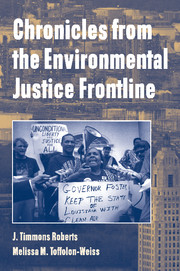Book contents
- Frontmatter
- Contents
- Preface
- 1 Environmental Justice Struggles in Perspective
- 2 Roots of Environmental Injustice in Louisiana
- 3 The Nation's First Major Environmental Justice Judgment: The LES Uranium Enrichment Facility
- 4 EPA's Environmental Justice Test Case: The Shintech PVC Plant
- 5 Media Savvy Cajuns and Houma Indians: Fighting an Oilfield Waste Dump in Grand Bois
- 6 Stress and the Politics of Living on a Superfund Site: The Agriculture Street Municipal Landfill
- 7 The Empire Strikes Back: Backlash and Implications for the Future
- Online Resources on Environmental Justice Struggles
- Suggested Places to Start: A Few Worthwhile Next Readings
- Notes
- References
- Index
4 - EPA's Environmental Justice Test Case: The Shintech PVC Plant
Published online by Cambridge University Press: 05 July 2014
- Frontmatter
- Contents
- Preface
- 1 Environmental Justice Struggles in Perspective
- 2 Roots of Environmental Injustice in Louisiana
- 3 The Nation's First Major Environmental Justice Judgment: The LES Uranium Enrichment Facility
- 4 EPA's Environmental Justice Test Case: The Shintech PVC Plant
- 5 Media Savvy Cajuns and Houma Indians: Fighting an Oilfield Waste Dump in Grand Bois
- 6 Stress and the Politics of Living on a Superfund Site: The Agriculture Street Municipal Landfill
- 7 The Empire Strikes Back: Backlash and Implications for the Future
- Online Resources on Environmental Justice Struggles
- Suggested Places to Start: A Few Worthwhile Next Readings
- Notes
- References
- Index
Summary
INTRODUCTION
Coming from a long line of sugar farmers, Dale Hymel is the President of the Council for St. James Parish, lying roughly halfway between New Orleans and Baton Rouge. In spite of his tie to farming, Hymel recognizes that “the majority of people realize that industry in this area is the driving force in the parish. Without industry we would have to go back to where we were before in the thirties and forties with just agriculture and trapping and logging. That doesn't pay a whole lot of money in wages.” The industry Hymel refers to is eighteen chemical plants and manufacturers of all sizes, which employ approximately 1,800 people and contribute significantly to the local tax base.
To keep the parish economy growing, Hymel believes that the parish government should assist all business and industry in developing in any way it can. He said that the government will provide companies with access to office space, phone, and copy machines while they are getting set up in the parish. He also believes that local government representatives should “walk” companies through the permitting process, making them aware of parish ordinances and regulations, and generally make the businesses feel welcome.
Hymel believes that community residents have a minimal role in decision making concerning which industries should be welcomed into the parish. He views the community's role as electing leaders, such as himself, who will, in turn, make the development decisions for the parish.
- Type
- Chapter
- Information
- Chronicles from the Environmental Justice Frontline , pp. 101 - 136Publisher: Cambridge University PressPrint publication year: 2001



